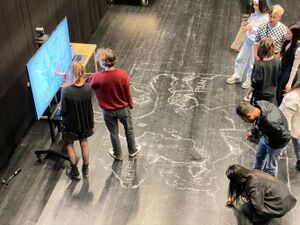Canon project
The Erasmus+ strategic partnership project CANON ran between 2019 and 2022. The outputs of the project are available online, at the web links shown below.
The aim of the CANON project is to create awareness about the history and heritage of technical theatre. It has developed a ‘canon’ of technical theatre history, supported by an interactive timeline, as well as tools and methodologies for teaching. Through the process, it has developed a network of like-minded people that support the goals of the project.
What is our knowledge of the history of technical theatre? And is this knowledge the same in all European countries, or do we think differently about past inventions, events and developments? How do we select, what do we select? How and what do we want to teach? We explored these questions with 20 teachers and 76 students from 9 universities and institutions from 7 different countries (Belgium, Czech Republic, Germany, Italy, Spain, Sweden, UK). This international cooperation meant that we could draw on different – regional – points of view, and the different background of the participants (architects, scenographers, technicians, theatre practitioners, theatre historians), to expand and enrich our view.
The Canon project builds on previous research and resources relating to the history of technical theatre. More than that, it continues a significant tradition of sharing information and ideas, based on principles of mutual support and cooperation. Within the theatre technical field, sharing information is crucial. Most professional organisations like OISTAT, STEPP and others have in their mission statements such as ‘to stimulate the exchange of ideas and innovations’, ‘to share knowledge’, ‘to encourage life-long learning’, ‘Informing our members’, and so on. Often the sharing is more informal between members, but some collaborative projects have received international recognition.
One example is Theatre Words, an OISTAT project that started in 1975 and collected more than 2000 theatre terms in 25 different languages. In 2011 Digital Theatre Words, was presented at the Prague Quadrennial. The Canon project’s database ‘Canonbase’ has used the information to develop a taxonomy, and has added further historical terms. The EUTA Theatre Architecture database and Observatorio de Espacios Escénicos are two other examples of open data generated by international groups in our field. The first lists important historic theatres and describes them. The second is an observatory that places the theatres on historic maps.
The Canon of Technical Theatre History project started in 2019 and builds further on this tradition. The Canonbase integrates and safeguards information from different open sources, and makes collections accessible that are otherwise hard to find. It links the information together so new relations become visible and the information is enriched with source documents. Moreover, it visualises the information by means of timelines, maps, trees and word clouds. The project also created new information by researching in depth the information gathered in the database. This resulted in one hundred stories that summarise key practices, people, technologies and turning points in technical theatre history.
The information is structured in an open data format, so it can be reused by querying the database or exported after the project to the world-wide Wikidata platform. The project setup and methodology guarantees that research from both teachers and students feeds back into education and to the wider professional field. The results can be used by local stakeholders, which reinforces the link between the local community and the educational field. The network that originates from this cooperation guarantees future development and sustainability of the results.
Technical theatre has a rich heritage, reflecting not only the theatre practices of the time, but also the wider cultural, technological and social context. It is a heritage that is worth preserving, for it has important stories to tell to students of theatre, theatre professionals, researchers and the wider public – and that is the purpose of the CANON project.
- Project website: canon-timeline.eu
- Database: canonbase.eu
- contact: info@canon-timeline.eu
- agreement number: 2019-1-BE02-KA203-060354

